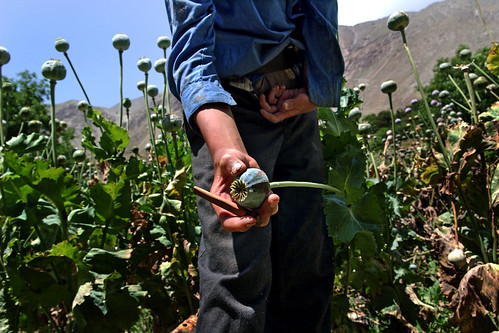Ungebrochene Wachstumstendenz: Opium aus Afghanistan
Afghanistan hält nach wie vor den weltweiten Rekord im Mohnanbau und der Opiumproduktion – und erzielt damit zehn bis 15 Prozent seines Bruttoinlandsprodukts. Schlimmer scheint noch, dass das Wachstum ungebrochen ist: 2013 stieg am Hindukusch im dritten Jahr in Folge die Anbaufläche, wie aus dem jüngsten Bericht der UN-Organisation gegen Drogen und Kriminalität (UNDOC) hervorgeht. UNDOC-Chef Yury Fedotov nannte die Zahlen nüchtern in dem am (heutigen) Donnerstag in Wien vorgelegten Bericht:
The surge in opium production in Afghanistan represented a setback, said Mr. Fedotov, since the world’s largest opium-poppy grower had increased its area under cultivation by 36 per cent from 154,000 hectares in 2012 to 209,000 hectares in 2013. With a crop yield of some 5,500 tons, Afghanistan accounted for up to 80 per cent of global opium production.
Dabei haben sich die Drogenschmuggler neue Märkte und Absatzrouten erschlossen, heißt es in der Zusammenfassung des Berichts:
For the third consecutive year, Afghanistan, which has the world’s largest opium poppy cultivation, saw an increase in the area under cultivation (from 154,000 hectares in 2012 to 209,000 hectares in 2013). (…)
There is evidence that Afghan heroin is increasingly reaching new markets, such as Oceania and South-East Asia, that had been traditionally supplied from South-East Asia. The long-established Balkan route seems to remain a corridor for the transit of Afghan heroin to the lucrative markets in Western and Central Europe, but its importance has declined due to various factors such as more effective law enforcement and a shrinking market in Western and Central Europe, as seen by the decline in opiate use and seizures in the subregion and the reduced level of supply compared with the peak levels of 2007.
The so-called “southern route” is expanding, with heroin being smuggled through the area south of Afghanistan reaching Europe, via the Near and Middle East and Africa, as well as directly from Pakistan.
Bereits am Tag zuvor hatte der UNDOC-Chef dem UN-Sicherheitsrat über die Drogensituation speziell in Afghanistan berichtet. Im Land würden zwar die Bemühungen um eine Begrenzung der Produktion fortgesetzt, Korruption und interne Probleme hätten aber dennoch zu einem Anstieg geführt:
Over the last decade, drug cultivation and production have been the most profitable illicit and criminal business activities in Afghanistan. At UNODC, we estimate that, the global opium market is worth some 68 billion US dollars, and 80 per cent of the world’s opium and heroin are produced in Afghanistan. The narcotics trade may be worth between 10 to 15 per cent of the country’s GDP.
In 2013, the area under poppy cultivation reached an historical high of 209 thousand hectares. Opium production increased by 50 per cent, compared to 2012, rising to 5.5 thousand tons.
Afghanistan remains at the centre of a multi-billion dollar illicit business that impacts on security, the rule of law, health, as well as sustainable development. And this is being driven not only by global consumption, but also by domestic speculation and corruption.
The link between the lack of security and opium cultivation is also evident. 90 per cent of total opium poppy cultivation in Afghanistan takes place in the Southern and Western provinces, the most insecure areas, where anti-government elements and drug traders are extremely active.
Money laundering is hindering proper tax collection, and creates an under-resourced government bereft of the financial means to confront illicit drugs. This is true on both the supply side and the demand side, where the country has the highest rate of opium addiction in the world.
Unfortunately, these problems have not been concretely reflected in the Kabul and Tokyo processes. As a result, counter-narcotics efforts were not given a high priority by national and international stakeholders.
However, it would be unfair to say that nothing has been done to confront this challenge. Here are just a few facts and figures on the most recent developments. Notwithstanding the election period and security concerns, the Afghan counter-narcotics police have continued with the eradication of opium crop in 12 provinces; although the figure of 1,600 hectares eradicated from the beginning of the season to 2 June is down on previous years.
(Archivbild 2005 – UN Photo/UNODC/Zalmai)




Der einzige Sektor der afghanischen Wirtschaft, der wächst, ist also der, den wir nicht gefördert haben.
@Andreas Moser: da gibt es unterschiedliche Auffassungen bezüglich der Förderung, wenn mit „wir“ der „Westen“ gemeint war.
Der Grund wieso die Bauern das dort machen ist ja angeblich ähnlich gelagert wie beim Thema Afrika und „Hungerhilfe“, durch die Lebensmittelspenden kann man mit Lebensmittelanbau einfach nicht überleben.
Dafür gibt es mehrere Gründe: Boden für andere Kulturen nicht geeignet, Zwang (durch Warlords), relativ (sic!) gute Einnahmen.
Allerdings gab / gibt es gute Ansätze, alternative Pflanzungen anzulegen.
Davon ab ist es mir unbegreiflich, warum man den Anbau nicht einfach unterbindet, natürlich mit begleitenden Maßnahmen.
@Thomas Melber, Stuttgart
…weil es Millionen von counter-drugs-Beschäftigten gibt, die ohne dugs einfach arbeitslos wären ?
Zu den Effekten die diese Entwicklung auf den iranischen und afghanischen Staat und seine Gesellschaft hat, existiert eine, meiner Ansicht nach, gelungene Dokumentation von VICE:
Staffel 2 Folge 11 vom 6 Juni 2014 mit dem Titel: Heroin Warfare Dauer ~ 14 min
Wem das zu lang ist:
Auf Youtube „VICE on HBO Debrief: Heroin Warfare“ Dauer 4:27
….und mit dem Opium werden die Waffen gekauft gegen die Nato , und das Geld geht vielleicht auch weiter für die andere kriege gegen den Westen
Ist doch eigentlich wunderbar. Da sehen wir exemplarisch, wie das freie Spiel der Marktkräfte segensreich zum Wohle der Bauern tätig wird. Die USA müssten jetzt begeistert sein. Fehlt noch eine Nordamerikanisch-Afghanische Freihandelszone in der die Hersteller im Interesse des freien Welthandels lästige Handelsbeschränkungen á la deutsche Gentech- Beschränkung per privatwirtschaftlich organisierten Schiedsgerichten abgeschafft werden können und alles ist gut. Ich bin sicher, die FDP könnte ein paar unterbeschäftigte Fachleute dafür benennen.